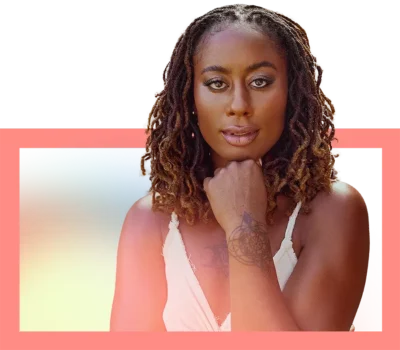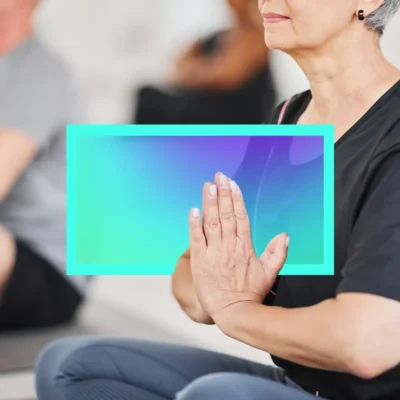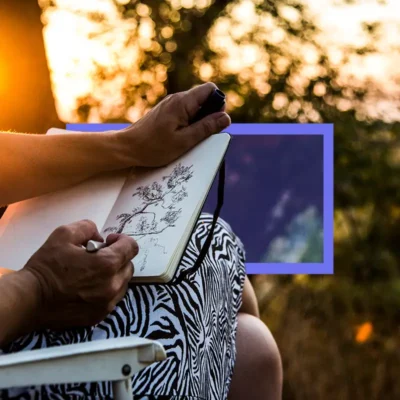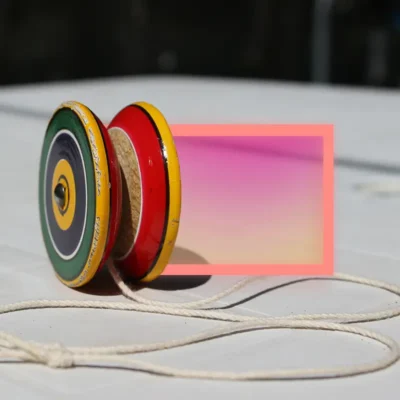How I connect to my unique place in history
Actress Zuri Adele, known for playing Malika Williams on the popular Freeform show Good Trouble, spent parts of her childhood largely isolated. But while attending Spelman College in Atlanta, Zuri becomes immersed in the rich history and ritual of the African diaspora. This week, Zuri shows us how embracing her community and her unique place in history allows her to trade her feelings of isolation for connection.
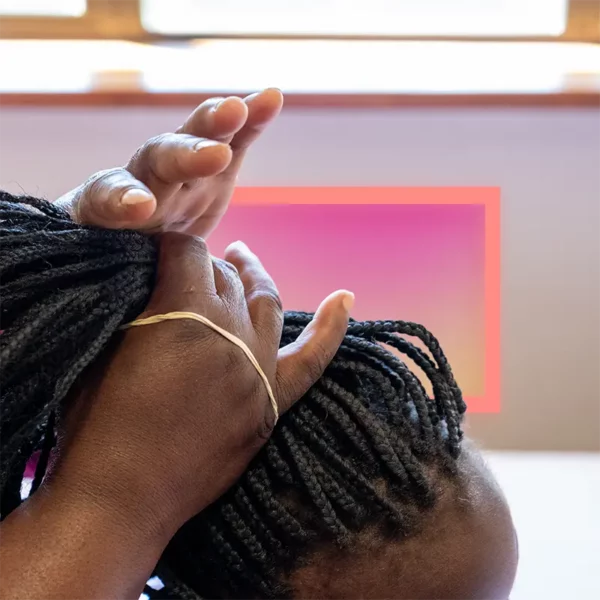
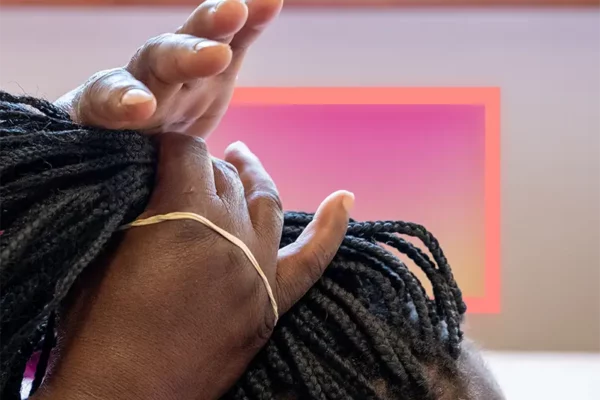
Table of Contents:
Transcript:
How I connect to my unique place in history
ZURI ADELE: Sis O walks along the glossy wood floors of the dance studio. Her gorgeous, booty length locks sway gently, filling the room with the sweet aroma of nature’s blessing scalp oil. In the wall of mirrors, I see a collection of curvy, Black bodies. Sis O’s son leads a group of 10 male drummers who play as we follow Sis O’s lead through stretches, warmups, and choreography across the floor and in groups as we cheer each other on.
ROHAN GUNATILLAKE: Zuri Adele, known for portraying Malika Williams on the popular show, Good Trouble, spends parts of her childhood feeling isolated. But as she grows up and immerses herself in newfound circles, she learns to connect to her ancestral past through performance and ritual. In this week’s story, Zuri shows us how by embracing our unique place in history, we are able to trade our isolation for connection.
In this series, we combine immersive first-person stories, breathtaking music, and mindfulness prompts so that we may see our lives reflected back to us in other people’s stories. And that can lead to improvements in our own inner lives.
From WaitWhat, this is Meditative Story. I’m Rohan, and I’ll be your guide.
The body relaxed. The body breathing. Your senses open. Your mind open. Meeting the world.
ADELE: I feel the soft carpet underneath me as I snuggle into my sleeping bag. Through the big sliding glass door of the living room I see the backyard of my friend Elizabeth’s house. Their patio and pool are just visible in the moonlight. I’m 12 years old, at a birthday sleepover.
Elizabeth’s mom calls over from the kitchen. “Ok, girls. Time to turn the TV off.” On cue, we finish our popcorn and start getting ready for bed.
I scan the room, noticing the sea of identical blonde and brunette haircuts swaying around my classmates’ shoulders. It feels like the calm before a storm. Almost everyone here is white or Asian, except me. That’s typical for where I live in Palo Alto. I’m one of only 3 Black girls in my class at school.
I reach into my overnight bag and pull out my satin scarf. I feel the soft, lightweight square in my hands. I fold it into a triangle and begin the process of tying it around my braids. I look at the girl sitting next to me. She has kind of brown skin like me, but she doesn’t have a satin scarf.
Noticing the curious blue eyes on me, I lovingly laugh to the girl who looks like me and say, “I got to tie my hair up, don’t you?”
She gives me a blank look and smiles awkwardly. It’s really quiet all of a sudden. Everyone is looking at me. I feel embarrassed.
Defiantly, I think to myself, “Molly has headgear, that’s way weirder!” But I don’t say anything. I just quietly finish tying my hair. Eventually, someone turns the lights off.
At 12 years old, I don’t know that this scarf is meant to protect my hair or to help it retain moisture. I haven’t yet learned that braids were used as maps to escape slavery and as storage for rice seeds by our ancestors. All I know is this is something my mom, aunts, cousins, and I do every night. It’s our ritual before bed. It feels important, like it’s a part of who we are — part of what makes me unique.
Lying on my back in the dark, I feel like a turtle that wants to crawl into its shell. I feel isolated. My body is tense. I’m bracing myself. I recognize this feeling of being the outsider. The only child. Maybe being unique isn’t necessarily a great thing.
I step through the gated archway onto the brick walking path. I see cleanly cut grass, dotted with trees — their branches spread wide, offering shade. Brick buildings that look like old homes surround the Quad — making the whole campus feel like a gorgeous, scholarly village. Along several walls, in bold blue, white, or brass letters, I read the words: Spelman College.
I’m 18. And I’m here in Atlanta for Spelbound — a two-day event where newly admitted students stay on campus in the freshman dorms. It’s exciting. It feels like a weekend-long ritual is about to take place.
Today is Fried Chicken Wednesday. Hundreds of people cram into the central Quad. The smell of soul food fills the air. Fried chicken, mac ‘n’ cheese, greens, yams, peach cobbler, catfish. All around me, I see all these Black women expressing themselves so differently. Some are wearing dashikis, some are wearing jeans and a t-shirt. I see students carrying violins, djembe drums, and robotics equipment. A bunch of ballerinas of all different shades of brown. I see afros, silk presses, braids, beads, Halle Berry cuts, headwraps, and hijabs. I hear accents from Brooklyn, New Orleans, Trinidad & Tobago.
Spelman is a Historically Black College. A women’s college. And there’s so much creativity here. So much diversity. So much Blackness. So much more than what I’m used to seeing in Palo Alto. I can feel my world expanding.
GUNATILLAKE: Zuri moves from a sense of isolation to one of connection. All of her boundaries expand. Let’s take a moment to notice our boundaries as they can be experienced right now. The skin of our body. The space we can sense around us. How solid are these boundaries? Try exploring what it might be to move beyond them.
ADELE: I stop at the edge of a crowd. Two groups of 20 girls come out in lines. One group is in red and white and the other is in pink and green. I recognize the second group’s paraphernalia — Alpha Kappa Alpha, just like my mom. We surround them. It’s a Stroll-Off — a dance competition that sororities and fraternities do. It’s steeped in a rich history of Black collegiate culture, and it’s fun. There’s a rhythm to it. You feel it in your bones. The singing, chanting, call-and-response, stepping and clapping all feels deeply ancestral. I look around me: These people from all over the country, all over the world, taking part in this joy — this unique culture that we share.
Spelman feels like a new world and, at the same time, it feels like home. LIke I’m starting to glimpse my own unique place in the world — my own place in history. I feel a sense of connection I haven’t felt before. I know in this moment that if I don’t go to school here, I’ll spend the rest of my life wondering what it would be like if I had.
The bright stage lights of the theater rehearsal space shine down on me. I kneel, feeling the hard wooden floor of the stage beneath me. I clasp my hands underneath my chin and squeeze my eyes shut, preparing for my next line:
“Please, God. Make me invisible. Please, please, please.”
Someone in the audience starts to cry. We’re all feeling it. It doesn’t matter that it interrupts the dialog. I hear someone else clap and stomp their feet against the floorboards. I give a subtle nod to my scene partner. We go on.
It’s now my sophomore year at Spelman and we’re rehearsing our production of “The Bluest Eye,” based on the novel by Toni Morrison. The play touches on the complexities of colorism, classism, and the hypersexualization of black bodies. It can be triggering to perform, but at Spelman we’re taught that it’s important to tell stories like this — important to use our bodies and voices to represent the authentic experiences of Black women. So, I unbrace.
My theater classes at Spelman are like being in church. They’re rhythmic and full of life. From the stage, I hear the encouragement and agreement from the “amen corner.” There’s an energy, a soul, and a richness. When we’re collectively creating art, it’s like we’re praying together. It’s a moment of praise and worship.
In these classes and others at Spelman, I learn for the first time about griots — the West African traveling storytellers who spread oral histories through music, poetry, and performance. My professors talk about the sacred nature of passing on our history. I start to see myself as a griot — a storyteller carrying the history of my people. I take it as a badge of honor. Theater is how I express myself. It’s how I want to share our story.
The next day at 8am, we have African dance class with Sister Omelika. Sis O walks along the glossy wood floors of the dance studio. Her gorgeous, booty length, locks sway gently, filling the room with the sweet aroma of nature’s blessing scalp oil. In the wall of mirrors, I see a collection of curvy, Black bodies. The dress code includes leggings or bike shorts and a sarong or wrap around the waist. Sis O’s son leads a group of 10 male drummers who play as we follow Sis O’s lead through stretches, warmups, and choreography across the floor and in groups as we cheer each other on.
At the end of class, our bodies glisten with sweat. We stand in a circle for our closing ritual and we recite in call and response: “I honor the place within you where the entire universe resides. (I honor the place within you where the entire universe resides). I honor the place within you where there is truth, where there is peace, where there is love. (I honor the place within you where there is truth, where there is peace, where there is love). I honor the place within you, where if you are in that place in you and I am in that place in me (I honor the place within you, where if you are in that place in you and I am in that place in me). Then there is only one of us. (Then there is only one of us). Ase. (Ase).”
I feel a connection to the people I meet at Spelman. These women who came here to learn about themselves like I did. I want this sense of connection, this acknowledgement of our unique place in history, to exist everywhere.
We sit in a circle of gray chairs surrounded by bare white walls. The room is really quiet. Everyone silently reads today’s scenes — Shakespeare. I keep thinking how weird it is that there’s a fireplace in here. It’s more like a room in somebody’s old, drafty house than a classroom.
I’m in London, studying abroad for my junior year at the British American Drama Academy. The energy at BADA is sophisticated. There’s an emotional openness when we perform, but it doesn’t feel like it did at Spelman. While it is a space of playfulness and exploration, the classes don’t feel like church.
There are about 30 of us in this program. Each day we split into smaller groups. I’m the only Black person in my group. That sense of isolation creeps back in.
The professor calls on me to perform my Lady Macbeth monologue first. The student sitting next to me smirks and says, “Oh, it’s because you’re Black,” and laughs.
It’s not the first time he’s said something like this. He always makes comments about race. It doesn’t really feel like bullying. It’s just annoying and exhausting.
The student’s comment hangs in the air. I just roll my eyes and look back at my script. I don’t say anything. I don’t want to be confrontational.
So, I remind myself of the little girl at the sleepover. I tell her, “You will either need to suppress the things that make you unique, or you will need to curate your own community.”
During my time in London, I work with some amazing artists. I see bold theater, learn stage combat, travel across Europe, play roles on London stages that push and grow me as an actor. All while cultivating my own community of beautiful English and American black kinfolk around town.
But something is missing. I crave the consistent sisterhood and ritual that underscores my studies at Spelman. I miss that sense of connection to what I’m doing and the people I’m doing it with.
A group of black and brown pre-teen girls runs past the cafeteria. Their forest green jackets are nicely pressed and their knee-length skirts swish over their tights. These 12 to 14 year olds live in the dorm where I’m a resident assistant here in Gauteng, right outside of Johannesburg. So many of them look like me when I was their age. They all know and share the scarf ritual at bedtime, and I beam for young Zuri in Palo Alto.
When my years in London ends, I plan to go back to my community in Atlanta. I’m ready to focus on my career. But a Spelman professor recommends me for a summer internship at the Oprah Winfrey Leadership Academy for Girls in South Africa. It’s a boarding school for underserved teen girls with high academic potential. It’s a phenomenal opportunity, but it’s not part of my plan, which is to start auditioning and pursuing my acting career in the U.S. I’m resistant. But my mentor Terri tells me I’m crazy to pass on this opportunity because “the best actors experience LIFE!” So, I surrender my plan to a greater plan.
“Sis Zuri, Sis Zuri! Can I braid your hair?” one of the girls shouts. “After our fashion show in the dorm tonight!” I say.
All the girls at the academy call me Sis Zuri. And I think of them as my little sisters. There’s instant kinship. They’re curious about the world, about themselves, and about me. Because I’m 21 they look to me for answers. They trust me. That feels like an honor.
The girls sit anticipating their turn to braid my hair. Spontaneously, they start singing a song together. They clap their hands in a syncopated rhythm, tap their feet against the floor. One of them sings the words wrong and they all fall out laughing. The collective joy here is contagious.
In class, I teach everyone the theater games I learned at Spelman and BADA. They teach me games of their own. The sing-songy rhythm keeps us all engaged. I help the older girls with monologues from more dramatic plays. Some of them are written by South African playwrights I’m not familiar with and am excited to learn more about. I love seeing my students engage with their own culture and find work that speaks to their specific experience.
I think to myself: These girls are griots, just like me. We pass on our history as a necessity.
GUNATILLAKE: What is a story about your direct lineage or the lineage of people close to you that has real meaning for you? Take your time and bring it to mind. Let’s feel what it is like to have the story alive in you. How does it feel to embrace your unique place in history? What connections do you feel?
ADELE: The girls at the academy come from different regions of South Africa. They speak different languages, different dialects, have different accents. Everyone is their own shade of brown with their own gorgeous hair texture. But there’s a shared rhythm to everything we do. The way we all sing and play and learn new dances. There’s a spoken celebratory energy to it all.
I realize the feelings of sisterhood and shared history I encountered at Spelman exist here too. But there’s something different about it. I’m not a part of South African culture in the way that these girls are. I’m American. I have my own unique path that led me here. In some ways, I’m an “other.” But I’m starting to see that being unique doesn’t mean that I have to be alone. I can share my story with these girls. And they can share theirs. When we all embrace our unique place in history, when we carry that lineage forward into our art, our play, our very existence, we’re no longer isolated by our differences. We connect ourselves to something bigger — to a collective feeling of home.
The door to the transportation van opens and I step out onto Spring Street in Downtown Los Angeles. My vision is flooded with protests signs, banners, and bright lights. I hear dozens of people chanting and shouting. The tan brick tower of City Hall stands out against the clear blue sky. At the top of the building’s front steps, there’s a podium and microphone set up for me.
I start crying and breathing deeply, thinking, “Wow, this looks like a real protest.”
It’s one of my first days working on the TV show, Good Trouble, where I play Malika Williams, a role and opportunity that feels like my soulmate. In this scene, my character is speaking out against police brutality at a Black Lives Matter event. My head is buzzing. Production is fast-paced. Hair, makeup, and wardrobe artists are all touching me. The director, producer, writers, dialect coach, my scene partner, and script supervisors are all giving notes. Sound is adjusting my mic. I’m trying to stay emotionally present. It all feels overwhelming.
I pause and take a breath. I try to zoom in on what’s important. The story we’re telling, its place in my culture, in our history, in me. Seeing the diverse group of protestors petitioning for the value of black life, feels poignant and ancestral. This protest is being staged for a TV show, but it feels like life or death. It represents a real struggle that has happened and is happening. And we’re sharing that with the world. This is how we pass on our legacy.
I begin my slow walk up the City Hall steps. I pass by background artists dressed like protestors, holding signs with the face and name of Jamal Thompson, a fictional character representing the many black people who were murdered by police. When I reach the podium my colleagues look back at me. They honor me. I honor them. We each hold our unique place in history. And together, we tell the story.
I know now that what I had at Spelman and in South Africa was special, but it doesn’t have to only exist in those spaces. When I perform from my place in history, when I choose to acknowledge where I come from and what makes me unique, I trade my isolation for a sense of connection, of culture, of family. This is my opportunity to be the griot I was trained to be.
Rohan’s closing meditation
GUNATILLAKE: Thank you Zuri.
Whether it was Zuri’s dance classes or her theater training, she would have started with a warm up, so let’s do the same as we settle into our closing meditation today, based on the story she has just shared.
Noticing the echo of Zuri’s story in how our body is, how our mind is right now. The story has affected us in ways we know and maybe ones we don’t. Bringing some gentle awareness to how our posture is, noting any areas of softness or perhaps areas of holding. Allowing how we are to be how we are.
Knowing the breath as it is.
Knowing any energy in the mind as it is.
Knowing this as it is.
Celebrating the qualities of this moment, this moment of your being.
Theater classes as holy spaces.
The call and response of how Zuri teaches the girls in South Africa and they her.
The recognition that she can be, and now is, part of the griot tradition.
Zuri’s story is brimming with Zuri-ness.
And yours is brimming of you-ness.
The idea of being unique may not sit so well with all of us.
The idea that within us is that place Zuri speaks of so beautifully.
But that’s ok.
Remember that in many wisdom traditions, things like affirmations are not always intended as truths. Instead, they are tools. The idea being that when they are stated, we learn to watch the movements of the mind that arise — and learn from the patterns we see. Using those which serve and letting go those which don’t.
So with that in mind, I’m going to say Zuri and her class’ words and say them to you. I don’t know you, but as I say this now, I am bringing you to my mind. A little piece of everyday magic.
I’m saying these words to you and the invitation is to watch the mind and what it does in response.
I honor the place within you where the entire universe resides.
I honor the place within you where there is truth, where there is love, where there is hope. I honor the place within you, where if you are in that place in you and I am in that place in me, then there is only one of us.
Thank you Zuri and of course thank you.
We’d love to hear your personal reflections from Zuri’s episode. How did you relate to her story? You can find us on all your social media platforms through our handle @MeditativeStory, or you can email us at: [email protected].

